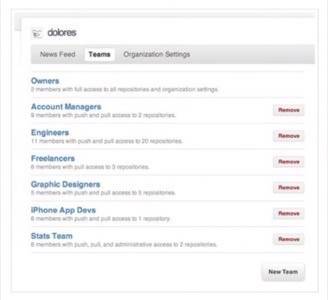Managing coding collaboration just got a lot easier. GitHub, the web-based code hosting project, announced today the introduction of “Organizations,” an easier way to manage group-owned code repositories. “Organizations” will facilitate the GitHub workflow for businesses and for large open source projects, making it easier to manage distributed teams as well as internal ones.

The new feature allows for the centralization of an organization’s code repositories. The feature creates an org structure, as well as permissions control, for the members of your coding team.

The organization administrator can establish settings, including establishing varying read/write and administrative permissions for team members.
Better Permissions Control
The permission levels include:
Pull Only: People can see the code, participate in private wikis, but cannot push code to the organization-controlled repository.
Pull+Push: Currently GitHub’s default permission setting, collaborators can participate in the project and push code but cannot change the repository’s meta data.
Pull+Push+Administrative: This new permission level allows you to grant participatory, push and administrative permissions. These members can do anything a repository owner can do.
Fork Friendly
If you have admin-level permissions on behalf of the organization, you can also “fork” your project to a new repository. Team members’ forks can be added to the organization’s repository as well.
Migrating from a shared user account into an organization is simple, says GitHub, as is the new pricing plan structure. Organizations for open source projects remain free of charge.

















